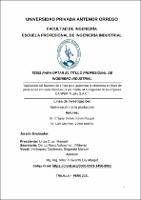Aplicación del Balance de Línea para aumentar la eficiencia en línea de producción en Semi Proceso 01 en Planta 04 Congelado de la empresa DANPER Trujillo S.A.C

View/
Download
(application/pdf: 6.132Mb)
(application/pdf: 6.132Mb)
Date
2022Author(s)
Chigne Simón, Kevin Roggero
Luis Mariños, Víctor Andrés
Metadata
Show full item recordAbstract
En la empresa Danper Trujillo SAC, para optimizar sus procesos de producción e
incrementar su eficiencia en línea de proceso, se optó por un estudio de Balance
de líneas, en la producción de Mango Kent en su presentación de cubitos del rango
de 10x10 mm hasta 15x15 mm, en planta de producción donde se lleva acabo
existen 04 etapas de procesos: Pelado, despepado, selección y cubeteado. La
presente investigación tiene como objetivo principal la aplicación de la Metodología
del Balance de Línea para aumentar la eficiencia en línea de proceso. Además, es
de tipo cuantitativa y descriptiva, debido a que se conllevará conclusiones
estadísticas, además desde la observación directa, se analizó a los trabajadores de
las diferentes etapas de proceso. En el desarrollo de la metodología del balance de
líneas, se inició como principal toma de datos a cada trabajador de avance más
rápido quien más adelante se va agregar factores de valoración y tolerancias totales
de cada etapa de proceso, y de esta manera se obtiene el tiempo estándar de cada
etapa de proceso, luego de la nueva demanda del cliente se genera un tiempo de
ciclo para así tener nuevas estaciones de trabajo. Al final del estudio se aumentó la
eficiencia en línea de proceso en un 16%, se redujeron los tiempos estándar de
cada etapa de proceso en Pelado de 17.22 segundos por h-H a 14.97 segundos
por h-H, en Despepado de 13.93 segundos por h-H a 13.04 segundos por h-H y en
Cubeteado de 9.36 segundos por h-H a 7.92 segundos por h-H; además, se
redujeron los tiempos muertos de 28.31 segundos por h-H a 7.51 segundos h-H;
por último se determinó el número de operarios para cada etapa de proceso de la
manera siguiente: Por cada 02 Peladores, debe haber 01 Despepador y 01
Cubeteador. Por último, se realizó la unificación de las etapas de despepado y
selección, dando una suma de 13.04 segundos por h-H, generando una
disminución de 0.89 segundos por h-H. Palabras Clave: h-H, eficiencia, tiempo de
ciclo, tiempos muertos, BPM In the company Danper Trujillo SAC, to optimize its production processes and
increase its efficiency in the process line, a line balance study was chosen, in the
production of Mango Kent in its presentation of cubes ranging from 10x10 mm to
15x15 mm, in the production plant where it is carried out there are 04 stages of
processes: Peeling, ginning, selection and cubeting. The main objective of this
research is the application of the Line Balance Methodology to increase the
efficiency of the process line. In addition, it is quantitative and descriptive, because
it will lead to statistical conclusions, in addition to direct observation, the workers of
the different stages of the process were analyzed. In the development of the
methodology of the balance of lines, each worker with the fastest advance was
started as the main data collection, who later on will add valuation factors and total
tolerances of each process stage, and in this way the standard time of each stage
of the process, after the new demand of the client a cycle time is generated in order
to have new workstations. At the end of the study, the process line efficiency was
increased by 16%, the standard times of each process stage in Peeling were
reduced from 17.22 seconds per hH to 14.97 seconds per hH, in Despepado from
13.93 seconds per hH to 13.04 seconds per hH and Cubed from 9.36 seconds per
hH to 7.92 seconds per hH; in addition, the dead times were reduced from 28.31
seconds per h-H to 7.51 seconds h-H; Finally, the number of operators for each
stage of the process was determined as follows: For every 02 Peelers, there must
be 01 Stripper and 01 Bucket. Lastly, the unification of the stripping and selection
stages was carried out, giving a sum of 13.04 seconds per h-H, generating a
decrease of 0.89 seconds per h-H.Keywords: h-H, efficiency, cycle time, dead times,
BPM
Collections
- Ingeniería Industrial [356]

